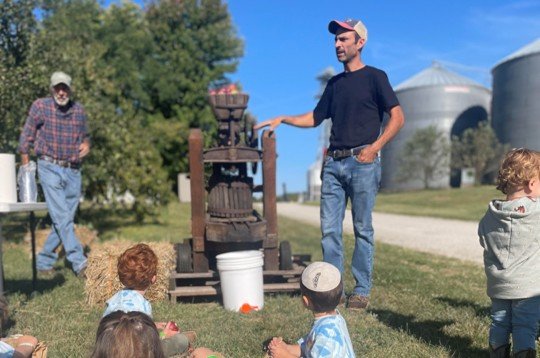Sweetness on Hamilton Road

By Anna Selman
LEBANON, OH — Plenty of families head to orchards this time of year for Instagram-ready apple picking, but this was different. I wasn’t there for a photo op. I was meeting the kindergarteners from Chai Tots—a Jewish Montessori in Mason, Ohio. They come each year ahead of Rosh HaShanah to pick apples, learn about honey and ride a hay wagon until they fall asleep on the way home. For them, the ritual isn’t seasonal décor; it’s liturgy with snacks.
I pulled into Spellmire Farms ahead of the bus that Tuesday morning with my coffee sweating in the cup holder. The weather was the kind of crisp, golden air that made Ohioans forgive the previous six months of weather. Sunlight peeked through the rows of apple trees, and ahead of me Jason Spellmire and his father, Bill, were bent over a cider press.
Spellmire Farms sits in Lebanon, just off Hamilton Road. Today, the farm is still primarily wheat, corn and soybeans. Jason and his wife, Hannah, are the third generation to steward it, and they’ve added a modest U-pick and a roadside table where apples, honey and sunflowers take turns announcing the week—a small side venture Jason hopes to grow. He told me there are fifteen apple varieties in the orchard, most of them Ohio heirlooms. Winesap “sings” in cider; Golden Russet behaves beautifully in the oven. These aren’t the identical, waxed spheres of supermarket display. They’re apples with opinions.
This year, the orchard earned its harvest the hard way. May was too cold; June wouldn’t stop raining. “Sometimes in the spring I’m out here burning firewood in old oil drums to keep the trees warm,” Jason said. “I think our neighbors suspect we’re having a séance, but really, I’m just trying to save the harvest.”
Bill still follows his father’s routine—freeze the cider, then simmer it with mulling spices for the holidays. The press dates to 1936, the year his father, Theodore, bought the farm. Side by side with Jason, Bill makes clear that tradition isn’t static; it’s handed off in real time.
Their neighbor Amy arranged the field trip—she has for three years now. Bill admitted he hadn’t known much about Rosh Hashanah until Amy moved in and started talking about it over bags of produce. Now the farm’s calendar and the Jewish calendar meet without ceremony: honey in July, apples cresting in September and, a few weeks later, dried corn stalks Amy tucks into her sukkah.
When the yellow school bus arrived, the children poured out with paper bags, which they promptly abandoned for immediate research. Nothing teaches “sweetness for the New Year” quite like juice running down your wrist. Lennox, a five-year-old with sticky hands and the gravitas of a critic, offered the official review: “It was really fun. The apples tasted really fresh.”
After the picking, Jason waved them to the press. One by one, the kids dropped apples into the hopper with the solemn joy of officiants, and Bill and Jason cranked together—steel turning, the orchard becoming juice—until the first amber ribbon appeared. The smell was instant and persuasive. A line formed, then dissolved, then re-formed, as paper cups were filled and emptied. “This is really good—can I have some more?” Zane asked, already extending his cup like a seasoned negotiator.
When I asked Jason why apples and honey make sense for Rosh Hashanah, he didn’t quote a text. He went older: apples are among the first fruits people knew; honey, before sugar, the sweetest thing a person could hope for. Dipping one into the other is the simplest way to say what the holiday asks us to say—may the year ahead be gentle, abundant and kind. And there’s another layer: the Bible’s promise of a land “flowing with milk and honey,” a shorthand for blessing that Jewish families still taste on their tongues. Standing beside a press older than everyone present, it felt less like a snack and more like a small, edible prayer.
The hayride rattled along the rows, laughter pinballing off the trees. By the time the bus pulled away, the bags were heavy, fingers sticky, and a chorus of “Shanah Tovah!” trailed across the field.
It would be easy to file the morning under “fall activities,” and many families will. But what happened in Lebanon, off Hamilton Road, was smaller and stranger in the best way: Jewish neighbors marking the New Year with the nearest things at hand—apples, honey, a borrowed field—and neighbors learning why that matters. In a year when the weather argued against sweetness, people chose it anyway, cranking an old press until it appeared. That’s tradition.